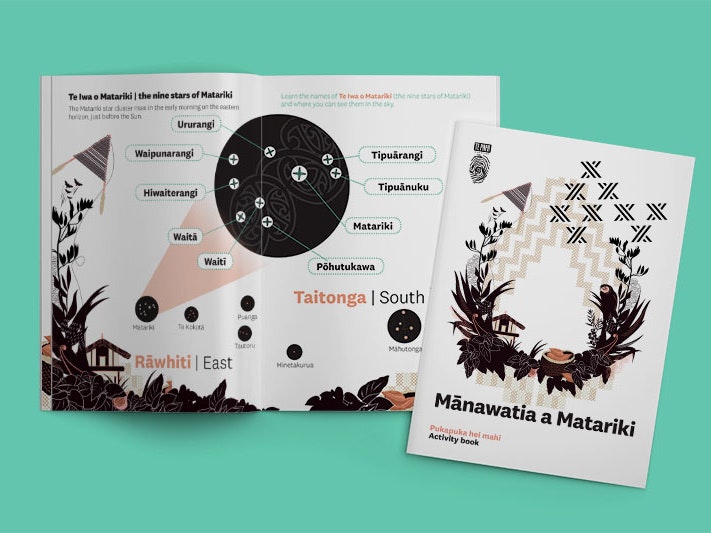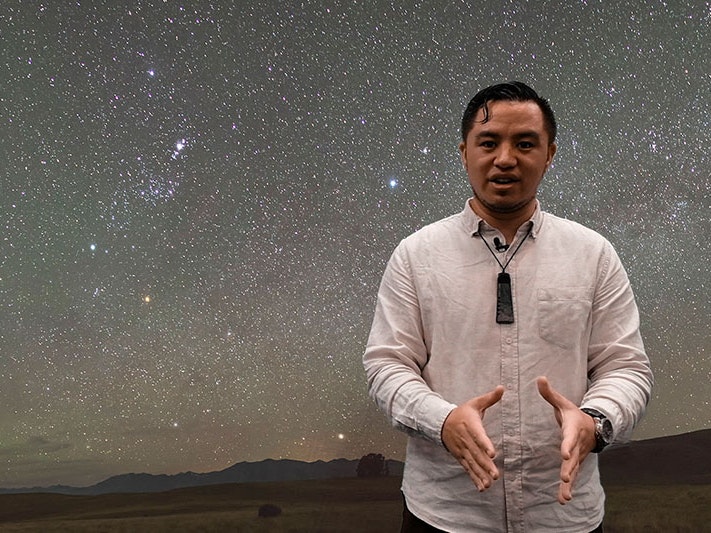Matariki and her daughters journey across the sky each year to visit their tupuna wāhine, Papatūānuku.
During this visit, each of the stars help Papatūānuku to prepare for the year to come, using their unique qualities or gifts to bring mauri to her different environments. Whilst spending time with their kuia, they also learn new skills and gain new knowledge from her, which they guard and pass on to others.
Matariki star cluster. Courtesy of Fraser Gunn www.astroimage.co.nz
Tupu-ā-nuku
Tupu-ā-nuku is the eldest of Matariki’s daughters. She spends her time with Papatūānuku tending to plants. She pays special attention to making sure they have everything they need to grow big and strong so they can produce kai, rongoā, and kākahu.
When we see her shining we are reminded that we all have our own special time and place, and to spend time growing our pūkenga, as well as that of our friends.
Tupu-ā-rangi
Tupu-ā-rangi loves to sing. Papatūānuku takes her to sing for te wao nui, and all the children of Tānemahuta. Her beautiful voice revives the forest and all the other creatures, including the manu, and mokomoko. They share their waiata, which fills the world with joy.
Tupu-ā-rangi learns these songs and holds them close to her heart. We learn from her the importance of sharing our gifts with others, and appreciating those shared with us.
Waipunarangi
Waipunarangi accompanies her grandmother to the waters – the oceans, lakes and rivers – where she prepares the children of Tangaroa to feed the people.
Papatūānuku also teaches her about how the water that spills down from Ranginui collects together to provide drinking water for the people, animals and plants.
She also watches how the water is evaporated by the heat of Tama-nui-te-rā into the clouds that cloak Ranginui, so that may rain once again.
Waipunarangi knows that if you give to others, all that kindness will come right back to you, and it is this lesson that she shares with us.
Waitī and Waitā
Waitī and Waitā are Matariki’s twins. Papatūānuku knew that they would be able to care for the smallest and fastest of creatures – because they too know about being a team.
When insects work together, they can they can do amazing things. Ngā pī, for example, pollinate all the flowers so that the plants grow, and we have air to breathe. Ngā pōpokoriki build huge, complicated tunnel cities underneath the ground, and carry many times their body weight.
When we see these two stars in the sky, we are encouraged to join in and support each other.
Ururangi
Ururangi enjoys racing all of her sisters to get to her kuia first. She claims the best spot on her grandmother’s lap and wraps herself in her arms, settling in for her favourite stories. Her tenacity and excitement, along with the awhi and her aroha, helps Papa to get into the right mood after the cold and darkness of takurua, to prepare with her older mokopuna.
Ururangi reminds us that a good attitude is always key to success.
Matariki
But what about Matariki you may ask? Well, she's doing what all good mothers (and other caregivers) do – watching over and helping out her tamariki. With her support, encouragement, and supervision, they will be able to do their very best.

